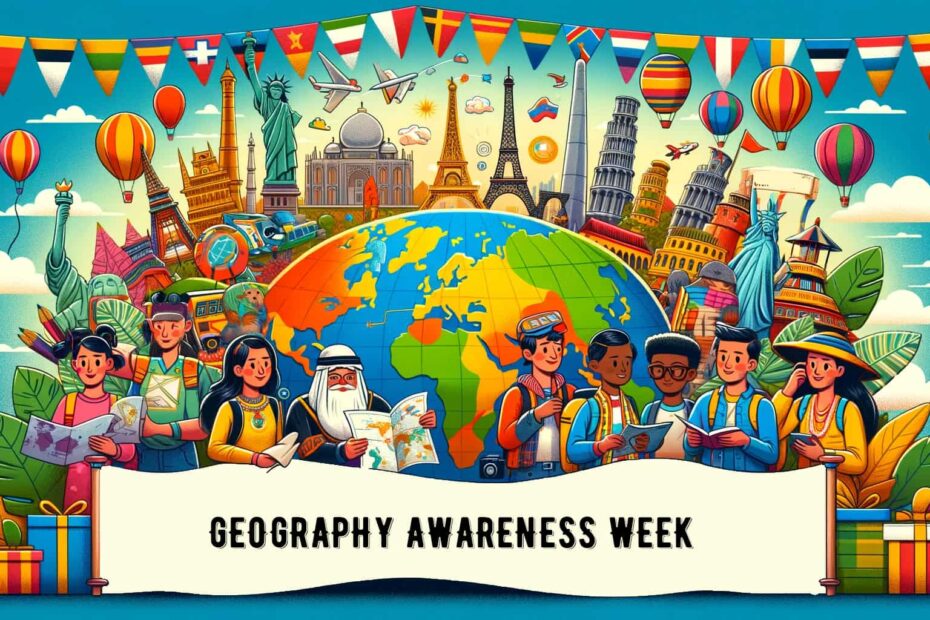Geography Awareness Week is an excellent opportunity to foster a deeper appreciation for our planet and its diverse landscapes. This annual event encourages us to explore the world around us, understand the importance of geography, and engage in activities that promote geographic literacy. In this guide, we’ll take you through the steps to make Geography Awareness Week a memorable and educational experience. So, let’s dive into the exciting world of geography!
To celebrate Geography Awareness Week, engage in fun and educational activities: host a geography trivia night, explore national parks, create world map art projects, embark on geo-caching adventures, and participate in virtual global travels.
How To Celebrate Geography Awareness Week
Geography Awareness Week is all about exploring the world, embracing the beauty of our planet, and enhancing our knowledge of geography. Here are some exciting ways to celebrate this week:

1. Host a Geography Trivia Night
Kicking off Geography Awareness Week can be both educational and fun with a geography trivia night. This is a fantastic way to engage people of all ages in the wonders of our world. Organize a mix of questions ranging from world capitals to lesser-known geographical facts. Enhance the experience by using interactive tools like online quizzes or apps. You can even include some interesting facts from the GIS Day to spice up your trivia questions. This activity not only tests knowledge but also sparks curiosity about different places around the globe.
2. Explore National Parks
National parks are treasures of the natural world and exploring them is a perfect way to celebrate Geography Awareness Week. Each park is a showcase of unique geographical features, from towering mountains to deep canyons. Plan a visit to a nearby national park, or if that’s not possible, take a virtual tour. Engage with park rangers to learn about the geographical significance of these natural wonders. It’s also an excellent opportunity to discuss the importance of conservation and the role of geography in understanding ecosystems, as highlighted in Why GIS Day is Important.
3. Create a World Map Art Project
Engaging in a world map art project is not only a creative outlet but also an educational experience. This can be a group activity in classrooms or at home, where participants create a large map of the world and decorate it with facts, pictures, or even 3D models representing different regions. Such activities blend artistic skills with geographical knowledge, making learning fun and interactive. For more inspiration, check out some unique ideas on GIS Day Activities for Kids.
4. Geo-Caching Adventure
Geo-caching is an adventurous way to celebrate Geography Awareness Week. It’s a real-world, outdoor treasure hunting game using GPS-enabled devices. Participants navigate to a specific set of GPS coordinates and then attempt to find the geo-cache (container) hidden at that location. This activity not only teaches basic GPS skills but also encourages exploration and understanding of geographical coordinates. It’s a perfect blend of technology and adventure, much like the events described in How to Host a GIS Day Event.
5. Virtual Travel Around the World
Virtual travel is an accessible way to explore the world from the comfort of your home. Use online resources to take virtual tours of different countries, exploring their geography, culture, and landmarks. This can be an enlightening experience for those who can’t physically travel. Websites and apps offer immersive experiences that make you feel like you’re actually visiting these places. Incorporating lessons from Geography Awareness Week can make this virtual journey even more enriching.
6. Geography Bee
A Geography Bee is a fantastic way to encourage learning and competition. Participants can be quizzed on a range of topics, from physical geography to cultural aspects of different regions. This can be organized in schools, community centers, or even online. It’s a way to challenge and stimulate young minds, fostering a love for geography. Drawing inspiration from GIS Day Games, you can add a variety of fun and educational twists to the competition.
7. Discover Cultural Cuisine
Exploring the world’s geography through its cuisine is both delicious and educational. Organize a cultural cuisine day where you cook or sample dishes from various parts of the world. Each dish can be accompanied by a discussion of its geographical origins and how local climate and terrain influence the ingredients and cooking methods. This tasty approach to geography makes learning about different cultures and regions an enjoyable experience for everyone.
8. Visit a Museum
Visiting a museum is a great way to delve into geographical history and culture. Many museums have exhibits on geographical themes, including interactive displays that can be both informative and entertaining. It’s an excellent opportunity to see historical maps, learn about different cultures, and understand the evolution of geographical thought.
9. Geographic Photo Exhibition
Organizing a geographic photo exhibition is a unique way to celebrate Geography Awareness Week. This could feature photographs from around the world, showcasing different landscapes, cultures, and geographical phenomena. It’s an opportunity for amateur and professional photographers alike to display their work and for viewers to travel the world through images. This exhibition can also be used to raise awareness about geographical issues such as climate change or urban development.
10. Environmental Cleanup
Participating in an environmental cleanup is a hands-on way to appreciate and contribute to our geographical surroundings. This could be a community event at a local park, beach, or forest. It’s a way to teach the importance of preserving our natural environment and the geographical impact of human activities. This practical approach to geography helps to instill a sense of responsibility and connection to the Earth.
11. Geography Book Club
A geography book club is an excellent way to end Geography Awareness Week. Members can read and discuss books related to geography, travel, and cultures from around the world. This encourages learning and sharing of knowledge in a social setting. Choose a variety of books, from travelogues to academic texts, to cater to different interests and expand your geographical understanding.
Conclusion
Geography Awareness Week is a fantastic opportunity to explore the world, learn about different cultures, and appreciate the beauty of our planet. By following the tips and activities outlined in this guide, you can make the most of this special week and deepen your understanding of geography. So, go ahead and celebrate Geography Awareness Week with enthusiasm, curiosity, and a sense of adventure!
FAQs: Geography Awareness Week Celebration
When does Geography Awareness Week occur?
Geography Awareness Week typically takes place in the third week of November each year. The exact dates may vary, so be sure to check the official schedule.
How can I get involved in Geography Awareness Week?
You can get involved by participating in events and activities related to geography, such as trivia nights, educational workshops, and outdoor adventures. You can also follow the official Geography Awareness Week website and social media for updates.
How can I promote geographic literacy beyond Geography Awareness Week?
You can promote geographic literacy throughout the year by staying curious about the world, reading geography-related books, and engaging in discussions with friends and family about global issues.
What are some easy ways to celebrate Geography Awareness Week at home?
You can celebrate by participating in virtual travel experiences, creating a world map art project, or starting a geography book club at home.
What are some creative activities for Geography Awareness Week?
Creative activities include organizing a geographic photo exhibition, engaging in a world map art project, or exploring cultural cuisine.
What is the importance of celebrating Geography Awareness Week?
Celebrating this week raises awareness about the importance of geography in our lives, encourages environmental stewardship, and fosters global understanding.
